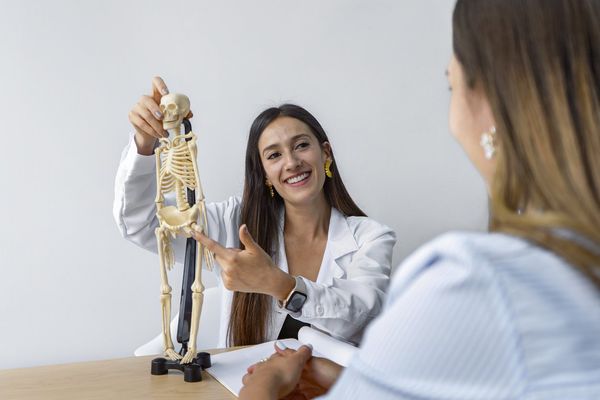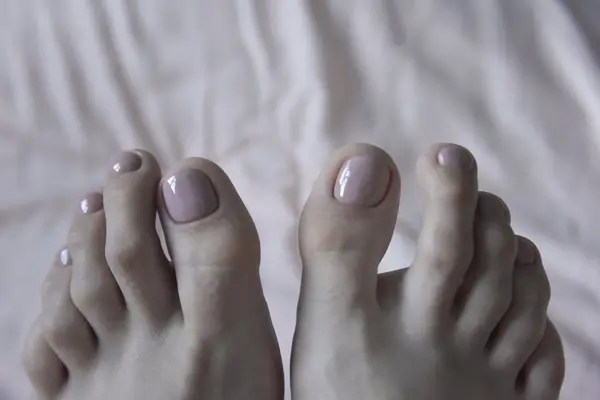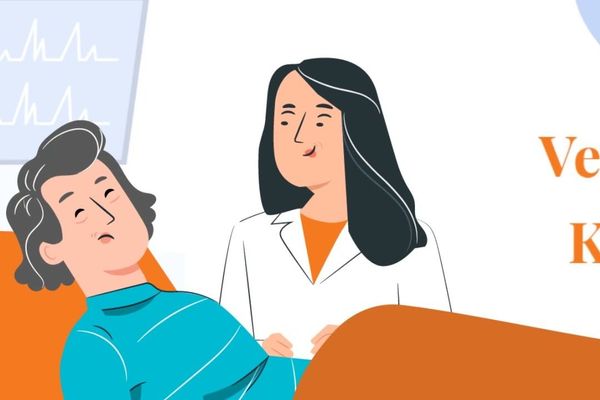This is the second in a series of posts based on Estrogen Matters: Why Taking Hormones in Menopause Improves Women's Well-Being, Lengthens their Lives—and Doesn't Raise the Risk of Breast Cancer and on Dr. Barb's interview with the authors. You can read the first in the series, about hormone replacement therapy, here.
You may want to sit down while reading this post, because everything you think you're doing to protect your bone health probably isn't—or at least not as much as you think.
Like thinning hair, bone weakening is a normal part of aging. Osteoporosis is different. It's when cavities develop inside the bone, thinning the bone and making it more brittle. When that happens in the femur, the result can be a hip fracture. And people who have a hip fracture are twice as likely to die in the five years after as people who haven't had a hip fracture.
Taking calcium to prevent osteoporosis doesn't help. Yes, you read that right.
Here's why. Bone is made of an outer shell and the osteoid, an inner network of collagen fibers that allow the bone to flex without breaking. Calcium strengthens the outer shell, but it doesn't help the osteoid, write the authors of Estrogen Matters. "Calcium supplements ... are ineffective in preventing postmenopausal osteoporosis or fractures because they do not affect bone resilience."
And while weight-bearing exercise makes bones stronger and more resistant to fracturing before menopause, it doesn't after you've gone through menopause.
So, calcium and exercise don't help with osteoporosis. What about Fosamax, Aredia, Zometa and other bisphosphonates? They can, but only in certain circumstances. They can stave off osteoporosis in women who are at high risk (i.e., women who are white or Asian, very thin or went through menopause early), and they can hold further bone loss at bay in women who already have it. But once you have osteoporosis, bisphosphonates won't reverse it.
Not every woman tolerates bisphosphonates well, with side effects including digestive issues, fatigue and insomnia. In addition, when taken over the long term, bisphosphonates may actually increase the risk of atypical hip fractures.
Is there a better answer? Estrogen replacement therapy (ERT) or hormone replacement therapy (HRT) was the standard approach in the 1970s, '80s and '90s—until the WHI report—because it was effective. Multiple studies have shown that estrogen significantly reduces the risk of hip fracture, some by as much as 50 percent. In fact, no therapy has proven to be better at preventing osteoporosis and fractures in the spine and hips.
For it to be entirely effective, however, women have to begin taking it in menopause and continue for the rest of their lives. We need to think of osteoporosis as a chronic condition, like hypertension or diabetes. Treatment through medication is of benefit, and when the treatment stops, the chronic condition continues its progress. Once a woman stops taking estrogen, she loses its protection. And, of course, being on any medication for the rest of your life isn't something you should take lightly.
Read more about The Pros and Cons of Hormone Therapy.
I encourage you to investigate HRT or ERT as an option regardless of what you've heard about it. As always, talk to your health care professional about your bone health, your particular health history and condition, your quality of life goals and what course of action is best for you.
Barb DePree, MD, has been a gynecologist for 30 years, specializing in menopause care for the past 10. Dr. DePree was named the Certified Menopause Practitioner of the Year in 2013 by the North American Menopause Society. The award particularly recognized the outreach, communication and education she does through MiddlesexMD, a website she founded and where this blog first appeared. She also is director of the Women's Midlife Services at Holland Hospital, Holland, Michigan.






